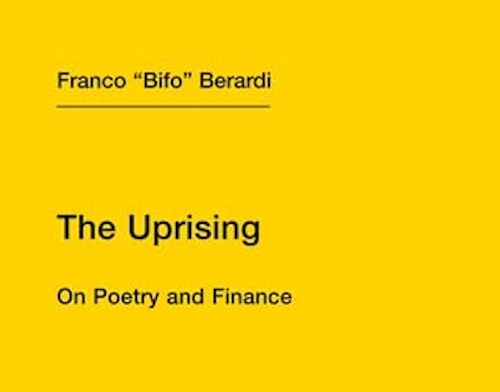Lacking Any Avant-Garde? A Review of Franco Berardi's The Uprising: On Poetry and Finance

We posted the audio not too long ago from a Franco "Bifo" Berardi talk at Pratt Institute on his book The Uprising: Poetry and Finance (Semiotext(e) 2012), which considers poetry as a salve in the wake of the international financial crisis. Or, as reviewer David Cunningham puts it now in considering the book for the UK's Radical Philosophy journal, the book "posits a parallel between ‘the deterritorialization effect’ which has, on the one hand, ‘separated words from their semiotic referents’ and, on the other, separated ‘money from economic goods.’" Cunningham, eventually, isn't a fan. First off:
‘These texts were written in 2011, the first year of the European uprising, when European society entered into a deep crisis that seems to me much more a crisis of social imagination than mere economies’, begins The Uprising. Yet the book is, for all its rhetorical urgency, unfortunately notable most for its repetitious and digressive form. The same examples and topics loop around, from the EU and Greek debt, to Bretton Woods and the gold standard, to May ’68 and punk, giving the impression of a text that has been left unrevised and unedited, dictated by whatever happened to occur to the author at the time. (No translator or original Italian text is cited, so one can presume it was written in English.) Pocket-sized as it is, this reads like a book with an article struggling to get out.
He goes on to ask: "What, then, of poetry?" Well:
In fact, as a form of cultural politics, Berardi’s mission statement is a simple if hazy one: ‘Only the conscious mobilization of the erotic body of the general intellect, only the poetic revitalization of language, will open the way to the emergence of a new form of social autonomy’. Poetry’s task is thus one of ‘reactivating the social body’, in which we ‘have to start a process of deautomating the word, and a process of reactivating sensuousness (singularity of enunciation, the voice) in the sphere of social communication’. There is, of course, a name for this kind of thing: romanticism. This is not immediately to damn it. In some sense, a ‘romantic’ moment would seem crucial to all effective (as well as affective) politics, if it is to be more than merely a matter of administration. And The Uprising is, even by usual standards, haunted by the memory of 1968 as a moment ‘when poetry ruled the streets’ (as Andrew Feenberg has it). The problem is that Berardi transparently has no idea of what this might actually mean today. As such, the text can finally have recourse only to a familiar set of organicist fantasies for which the poem appears, yet again, as the sensuous image of a freedom beyond all politics itself. (Lacoue-Labarthe and Nancy’s account of ‘speculative Rousseauism’ in The Literary Absolute, their study of Jena Romanticism, should perhaps have been added to the bibliography along with Writing and Difference.) As an avant-gardism, this is one lacking any avant-garde.
As much to the point, isn’t a certain ‘process of progressive abstraction’ a rather evident condition of the ‘general intellect’? What would be the contemporary (or, in fact, any) ‘sphere of social communication’ without this? Indeed, is it remotely possible to conceive of a global social collectivity that would not involve an experience of abstraction as, in some way, intrinsic to it? In which case, mere rhetorical invocations of our need to restore the bodily, the fleshy or the sensuous -somehow, magically, rendered collective in form – will not take us very far. It is, at any rate, hardly a surprise, therefore, that whatever faith is expressed by Berardi in those new ‘psycho-affective reactivation[s] of the social body’, to be glimpsed in ‘the English riots and the Italian revolts and the Spanish acampada’, this does not translate into anything as solid as a political strategy in The Uprising, while ‘poetry’ becomes not much more than a placeholder name for the forms of social life imagined for some phantasmatic Deleuzian ‘people’ to come. Such a sense that the ‘poetic’ offers some resistance to capitalist forms, as well as a speculative basis for a life beyond them, is scarcely a new one. In the end, however, for all the stress upon its own contemporaneity – and for all Berardi’s own like-ability – The Uprising has little more to offer than a reassertion of the romantic form of such an idea itself.


